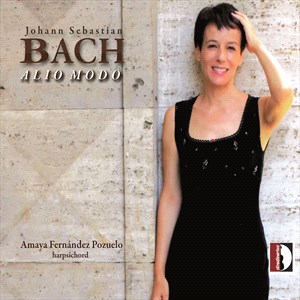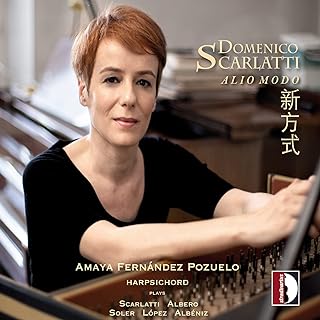


Duetto No. 3 in G major, BWV 804 Prelude & Fugue No. 7 in E-flat major, BWV 876 (Well-Tempered Clavier, Book 2) Capriccio sopra la lontananza del suo fratello dilettissimo in B-flat major, BWV 992 Prelude & Fugue No. 4 in C-sharp minor, BWV 849 (Well-Tempered Clavier, Book 1) Prelude & Fugue No. 8 in E-flat minor/D-sharp minor, BWV 853 (Well-Tempered Clavier, Book 1) Duetto No. 4 in A minor, BWV 805 Prelude & Fugue No. 20 in A minor, BWV 889 (Well-Tempered Clavier, Book 2) Duetto No. 1 in E minor, BWV 802 Chromatic Fantasia & Fugue in D minor, BWV 903 Duetto No. 2 in F major, BWV 803 Italian Concerto in F major, BWV 971
Alio Modo is Latin for "In Another Way". Spanish-Italian pianist Amaya Fernández Pozuelo goes on to explain: "The limits of notation, almost perfect for those times, lie in the performer's profound understanding of the author's style and of the relationship among structural rigour, stylistic-formal perfection, and free inventiveness. For this to occur, the musician-performer's intuition is to transcend and make the written signs meaningful and make them his or her own. Only in this way can the non-notatible, the unsaid but present, changeable meaning, emerge, as well as the allusion to and participation in the vast panorama of human emotions."
To further elucidate, look at it from this perspective. By now in the 21st century, practically everything has been performed and recorded many times over, so when a musician sets out to learn a piece of music, he or she can easily fall back on what they've already heard and use that as a springboard and refine their conception of the piece at hand. But imagine if you may that you are a 17th century organist in a small, remote church somewhere in Europe, and someone hands you one of Bach's manuscripts to play. Imagine the wide range of possibly varied interpretations .... And since Johann Sebastian Bach never thought that his music would still be scrutinized and performed 300 years hence, he never annotated any tempo or expressive markings on his music. Freedom of expression is still viable.
And not to worry, Amaya Fernández Pozuelo's personal views on the music are so subtle that unless you are extremely knowledgeable about said piece of music, you may not even notice any of the very slight alterations. What you will definitely notice, is clear, articulate and detailed playing which always brings out the complex, contrapuntal inner workings of the music. Pozuelo's intent, free of virtuosic artifice and affected mannerisms, is first and foremost at the music's service. A sense of long lines and clarity of expression are at the core of her interpretations. And for those of you interested in such details, the harpsichord used for this recording is a Ferdinando Granziera copy of a Hemsch instrument.
As you will have noticed on the left, I've included for reference, Amaya Fernández Pozuelo's previous 2021 recording featuring works by Domenico Scarlatti, Padre Antonio Soler, Sebastian de Albero, etc ... in which individual and personal interpretive touches à la Alio Modo, based on the rarity of the material, are even more in evidence.
Jean-Yves Duperron - April 2024 Prelude & Fugue No. 20 in A minor, BWV 889